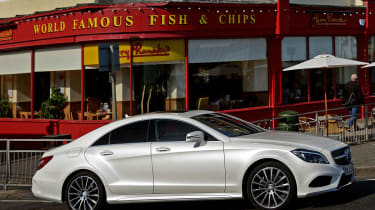Mercedes CLS saloon (2011-2017) - MPG, running costs & CO2
The basic CLS 220 diesel engine is the cheapest to run, but the CLS 350 BlueTEC is our top pick
The CLS is a sporty four-door coupe, so you could be forgiven for expecting it to be heavy on fuel, but if you get the right model, it's actually relatively efficient. Insurance won't be cheap, however, but Mercedes does offer fixed-price servicing plans.
Mercedes CLS MPG & CO2
The most economical versions of the CLS are the diesels. The Mercedes CLS 220 BlueTEC diesel is the cheapest to run, managing 61.4mpg fuel economy and CO2 emissions of 122g/km, so road tax will cost you just £110 a year – not bad for a car of this type.
The Mercedes CLS 350 BlueTEC diesel is our pick of the range, though, because it's quick yet also manages 52.3mpg economy and has CO2 emissions that equate to a £145 annual tax bill.
There are two petrol versions of the CLS, with the cheapest to run being the CLS 400. It's capable of 38.7mpg and CO2 emissions of 170g/km for an annual tax bill of £205. The other petrol model has a hugely powerful V8 engine, which makes it very expensive to keep on the road. This range-topping CLS 63 AMG manages just 27.2mpg and has CO2 emissions of 231g/km for road tax of £490 per year.
Insurance group
The most economical CLS model, the CLS 220, is also the cheapest to insure. It falls into group 43. The more powerful CLS 350 is in group 48. The CLS 400 falls into group 47, with the hugely powerful CLS 63 AMG firmly in group 50.
Servicing
Mercedes offers fixed-price service plans across its range, starting from £24 a month for two services over two years. You can also buy plans for three and five years.
Warranty
Mercedes offers a three-year/unlimited-mileage warranty to its buyers, which matches the cover offered by its biggest rival, BMW. Although companies like Audi and Lexus offer the same length of warranty, they limit their cover to 60,000 miles, so Mercedes and BMW drivers are better looked after in the long run.












